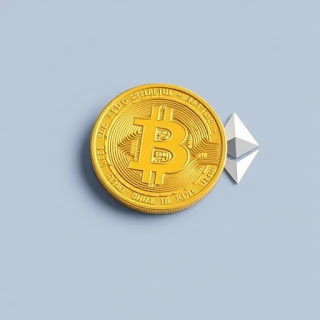Bitcoin (BTC) and Ethereum (ETH) are the two largest cryptocurrencies by market capitalization, but they serve very different purposes. Bitcoin is often called "digital gold," while Ethereum is described as a "world computer" for decentralized applications.
This guide breaks down their key differences in technology, purpose, and use cases to help you understand which one might suit your needs.
1. Origins & Purpose
Bitcoin (BTC) – Digital Gold
Created in 2009 by the anonymous Satoshi Nakamoto.
Primary Purpose: A decentralized peer-to-peer electronic cash system and store of value.
Key Innovation: First successful blockchain-based digital currency.
Ethereum (ETH) – Programmable Blockchain
Launched in 2015 by Vitalik Buterin and a team of developers.
Primary Purpose: A decentralized platform for smart contracts and decentralized apps (DApps).
Key Innovation: Introduced programmable blockchain technology.
3. Smart Contracts & Programmability
Bitcoin: Limited Scripting
Bitcoin’s scripting language is simple, designed mainly for transactions.
Supports basic smart contracts (e.g., multisig wallets), but not complex ones.
Ethereum: Turing-Complete Smart Contracts
Ethereum’s Solidity programming language allows complex decentralized apps (DApps).
Powers DeFi (Decentralized Finance), NFTs, DAOs, and more.
Example Use Cases:
Bitcoin: Payments, long-term investments, hedge against inflation.
Ethereum: Lending/borrowing (Aave, Compound), NFT marketplaces (OpenSea), decentralized exchanges (Uniswap).
6. Security & Decentralization
Bitcoin: More Decentralized Miners
Bitcoin’s PoW mining is highly secure but energy-intensive.
Mining is dominated by large pools, raising some centralization concerns.
Ethereum: More Decentralized Validators
Ethereum’s PoS relies on validators who stake ETH instead of miners.
More energy-efficient but requires holding ETH to participate.
7. Real-World Adoption
Bitcoin (BTC) – The Digital Gold Standard
✅ Institutional adoption (MicroStrategy, Tesla, El Salvador’s legal tender).
✅ Store of value (like gold, but digital).
✅ Preferred for large transactions and hedging against inflation.
Ethereum (ETH) – The Backbone of Web3
✅ Leading platform for DeFi, NFTs, and metaverse projects.
✅ Enterprise adoption (Microsoft, JPMorgan use Ethereum for blockchain solutions).
✅ Upgrading for scalability (Ethereum 2.0, Layer 2 solutions like Arbitrum, Optimism).
